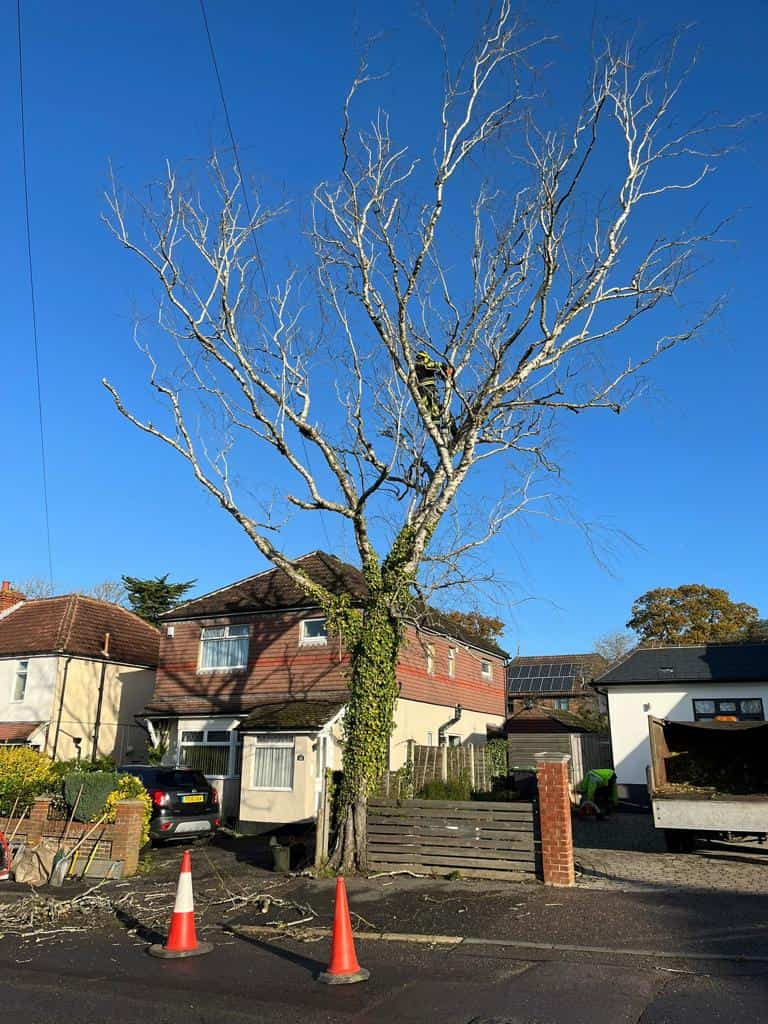Introduction
Trees are a beautiful and valuable part of any property, offering shade, privacy, and character to your outdoor space. But like any living thing, trees need care—and sometimes, they need to be removed. Knowing when it’s time to call in professionals like LM Tree Surgery Hayling Island can save you from costly damage and improve the health of your garden.
In Hayling Island, Hampshire, we often see homeowners wait until it’s too late to act. Tree cutting isn’t always about removing dangerous giants—it’s also about managing space, preventing hazards, and maintaining property value. Here are seven key signs that it might be time for professional tree cutting on your property.
1. Dead or Dying Branches
Deadwood is one of the most obvious indicators that a tree is in decline. These limbs can break off unexpectedly, especially in windy or stormy conditions, posing a serious risk to people, pets, and property.
Look out for:
- Branches without leaves in summer
- Cracking or peeling bark
- Branches that snap easily with no green inside
Removing dead branches—or the entire tree—can restore safety and open up space for healthier growth elsewhere.
2. Visible Decay or Disease
Signs of decay can indicate that internal damage has already taken hold. Fungus, oozing sap, or soft, spongy bark are red flags.
Common signs of decay include:
- Mushrooms growing around the trunk base
- Cavities or hollow sections
- Discolouration or unusual bark texture
If these issues are spreading, tree cutting may be the only effective solution.
3. Leaning or Unstable Posture
A tree that’s suddenly leaning more than it used to—or one that’s clearly off balance—could be unstable and dangerous.
Potential causes:
- Soil erosion or root instability
- Previous storm damage
- Weak trunk structure
LM Tree Surgery Hayling Island recommends immediate assessment for any tree with a noticeable lean, especially if it’s near buildings or walkways.
4. Overcrowding or Poor Location
Sometimes a tree is simply in the wrong place. If it’s overshadowing your home, blocking sunlight, or disrupting nearby structures, it could be time for removal.
Issues caused by overcrowding:
- Reduced airflow and sunlight for other plants
- Increased risk of disease spreading between trees
- Pressure on driveways, fencing, or drainage systems
Cutting down select trees can actually improve the health and appearance of your overall landscape.
5. Root Interference
Tree roots can stretch surprisingly far, often causing hidden damage to pipes, patios, or even building foundations.
Watch for:
- Cracks in paving or brickwork
- Blocked or broken drains
- Raised sections of lawn or pathways
In these cases, removing the problem tree is often more cost-effective than repairing recurring damage.
6. Storm or Wind Damage
High winds are common in coastal areas like Hayling Island, Hampshire, and they often leave trees structurally weakened or broken.
Post-storm inspection should check for:
- Hanging branches
- Splintered trunks
- Uprooted trees or loosened soil
Even if the tree is still standing, hidden weaknesses can create hazards later. Prompt tree cutting ensures safety moving forward.
7. Excessive Shedding or Mess
Some trees drop excessive seeds, fruit, sap, or leaves, making garden maintenance difficult and unpleasant.
Nuisance signs may include:
- Slippery footpaths due to fruit or sap
- Constant leaf clearing needed
- Damage to vehicles or property beneath
Removing high-maintenance trees can significantly improve the usability and cleanliness of your outdoor space.
Conclusion
Recognising when to cut a tree isn’t always straightforward, but it’s essential for maintaining a safe, attractive, and functional landscape. If any of these signs sound familiar, it’s worth consulting a professional for advice. At LM Tree Surgery Hayling Island, we’re committed to helping property owners across Hayling Island, Hampshire make the best decisions for their trees and their land.
Call us on: 023 8235 2063
Click here to find out more about LM Tree Surgery Hayling Island
Click here to complete our contact form and see how we can help with your tree needs.

